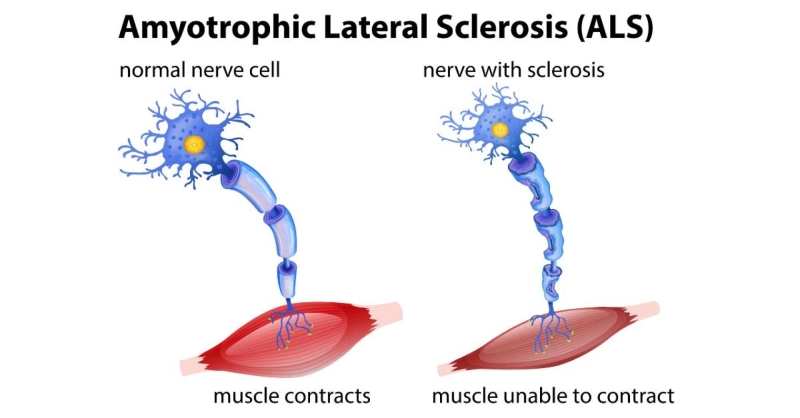Amyotrophic Lateral Sclerosis (ALS) Disease Overview:
Amyotrophic Lateral Sclerosis (ALS), often referred to as Lou Gehrig's disease, is a rare and progressive neurodegenerative disorder that affects the nerve cells in the brain and spinal cord. This devastating disease leads to the gradual loss of motor function, eventually causing paralysis and, in most cases, leading to a fatal outcome. In this article, we will delve into various aspects of ALS, including diagnostic analysis, treatment options, recent developments, the regulatory framework, clinical assessment, market trends, and regional insights.
One of the worst conditions that affects nerve and muscle function is amyotrophic lateral sclerosis. According to ALS cases, during the next 25 years, there will be an anticipated 69% increase in the annual incidence of ALS worldwide. ALS is more common in white men between the ages of 60 and 79, according to target ALS's most recent statistics. But there is no effective medication to reverse the progression of ALS, nor is there a cure. For now, advancements in the ALS treatment field are crucial.
The Market Competitors Listed Below are Revolutionizing Healthcare with Innovative Diagnostic Inventions:
Cipla LimitedHuman-Device Interaction LabSiemens HealthineersSun Pharmaceuticals Industries LtdJasperMed Imaging SolutionsApollo DiagnosticsAllengers Global Healthcare Private LimitedDiagnoTech CorporationReddy’s LaboratoryNexus Health CareUltraScan diagnosticsOthersThe Market Competitors Listed Below are Revolutionizing Healthcare with Innovative Treatment Inventions:.
Sun Pharmaceutical Industries Ltd.Mitsubishi Tanabe Pharma America, Inc.Amylyx PharmaceuticalsAmneal PharmaceuticalsHoffmann-La RochePfizerManus Aktteva Biopharma LLP.OthersDiagnostic Analysis:
Diagnosing ALS can be challenging due to its similarity to other neurological conditions. However, the diagnostic process may include the following:
Clinical Assessment: Physicians evaluate a patient's symptoms, medical history, and conduct neurological examinations to identify signs of muscle weakness, atrophy, and spasticity.Electromyography (EMG): This test measures electrical activity in muscles and can help detect signs of ALS.MRI and CT Scans: These imaging techniques can rule out other conditions and may show spinal cord and brain changes associated with ALS.Genetic Testing: Approximately 10% of ALS cases have a genetic component, and genetic testing can identify specific mutations.Treatment Analysis:
While there is no cure for ALS, various treatment approaches aim to manage symptoms and improve the quality of life:
Medications: Riluzole and Edaravone are FDA-approved drugs that can slow the progression of the disease.Physical and Occupational Therapy: These therapies help maintain mobility and independence.Speech Therapy: As ALS progresses, speech difficulties may arise, and speech therapy can be beneficial.Assistive Devices: Mobility aids, communication devices, and ventilatory support can assist patients in daily living.Clinical Trials: Ongoing research explores potential treatments and therapies through clinical trials.Recent Developments:
Recent advances in ALS research have led to a deeper understanding of the disease. These developments include a focus on genetic factors, potential drug therapies, and innovative approaches to symptom management.
Browse More Information:
https://www.diseaselandscape.com/neurodegenerative/amyotrophic-lateral-sclerosis-pharma-consulting
Regulatory Framework:
The regulatory framework for ALS treatments is overseen by health authorities, such as the FDA in the United States and similar agencies globally. Stringent regulations are in place to ensure the safety and efficacy of treatments for ALS.
Clinical Assessment:
Patients with ALS require ongoing clinical assessment to monitor disease progression, manage symptoms, and adjust treatment plans. Regular check-ups, physical evaluations, and discussions with healthcare providers are essential.
Market Trends Analysis:
The ALS market is witnessing several significant trends:
Genetic-Based Therapies: Research on the genetic factors contributing to ALS is shaping the development of targeted therapies.Stem Cell Research: Stem cell therapy and regenerative medicine approaches are being explored as potential treatments.Patient-Centric Care: A growing emphasis on patient-centric care, focusing on enhancing quality of life and addressing specific needs.Global Collaborations: International collaborations in research and clinical trials are fostering progress in ALS treatment.Regional Insights:
ALS prevalence, access to healthcare, and resources for patients vary by region. Understanding these regional disparities is essential to improving patient care and ensuring that the latest treatments and support are available to all those affected by ALS.
Conclusion:
ALS is a complex and devastating disease that presents significant challenges to patients, caregivers, and healthcare providers. While a cure remains elusive, ongoing research, advances in treatment, and a strong focus on patient-centric care offer hope for a brighter future for those impacted by this relentless disease.
Browse Through More Neurodegenerative Disorders Research Reports.
Related Reports:
Insights and Trends in the Global Landscape of Lung Cancer Services
The symptoms, transmission, and precautions of Monkeypox
The Myths of Pneumonia: Symptoms, Causes, and Prevention Methods
Navigating the Complex Autoimmune Disorder of Lupus
Ringworm Comprehensive Guide: Symptoms, Causes, and Treatment
Diverticulitis: A Complete Guide to the Symptoms, Causes, and Treatments
Contact Us:
Disease Landscape Insights LLP
6th Floor, Sr No.207, Office A H 6070 Phase 1
Solitaire Business Hub, Viman Nagar
Pune, Maharashtra, 411014.
Sales Contact: +44-2038074155
Asia Office Contact: +917447409162
Email: ajay@diseaselandscape.com
Email: vishal@diseaselandscape.com
Blog: https://www.diseaselandscape.com/blogs
Case Study: https://www.diseaselandscape.com/casestudies



